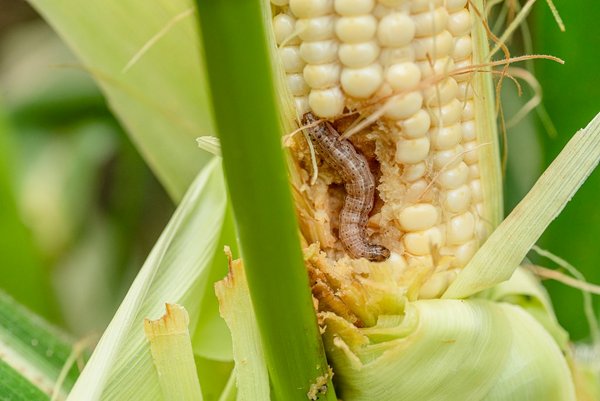 Read this article in French
Read this article in French- Share this article
- Subscribe to our newsletter
Most of Africa’s maize at risk from armyworm
Virtually all of Africa’s maize crop is at risk from the devastating fall armyworm pest (Spodoptera frugiperda) according to new research, CABI reported on its website in February 2023. This constitutes an exceptionally risky production environment for African maize producers.
Nearly 92 per cent of Africa’s maize growing areas support year-round growth of fall armyworm. Alarmingly, 95 per cent of the crop is also deemed climatically suitable for fall armyworm and at least three or more pests such as the maize stalk borer, Western corn rootworm and Asiatic witchweed.
Starkly, over half (52.5%) of the African maize area believed suitable for fall armyworm is at further risk from an additional nine pests, while over a third (38.1%) of the area is susceptible to another 10 pests.
Outbreaks of fall armyworm in Africa were first observed in southwest Nigerian maize fields in January 2016, and thereafter in Benin, Togo São Tome and Principe. Since then, the pest has spread to more than 40 African countries, including Ethiopia, Kenya and Tanzania.
In 2021, CABI scientists conducted the first comprehensive study on the economic impact of a range of Invasive Alien Species (IAS) on Africa’s agricultural sector which they estimated to be USD 65.58 billion a year. They established that the fall armyworm alone caused the highest annual yield losses at USD 9.4 billion.
“Climates that favour maize production are also seasonably suitable for fall armyworm infestations – not just in Africa. Indeed, around half of the world’s maize area, mostly in the moist and warm tropical locales, is also likely to sustain the development of fall armyworm year-round,” says CABI’s Dr Roger Day, Global Advisor, Plant Health. “Strategies to deal with fall armyworm, or any other crop pest are best conceived and executed from a multi-peril pest perspective – especially as part of an Integrated Pest Management (IPM) practice – rather than a piece-meal, pest-by-pest approach.”
The study concludes by suggesting that crop management may benefit more from genetic solutions and environmentally friendly biological control agents. These, the researchers say, require less frequent and timely trips to markets to secure necessary fungicides/insecticides as seasonal pest infestations unfold. However, they also admit that while IPM practices constitute another, often complementary, strategy for controlling crop pests, especially in tropical regions where natural enemies can have year-round survivability, IPM is not widely adopted in the developing world.
(CABI/ile)
Read more on the CABI website





Add a comment
Be the First to Comment